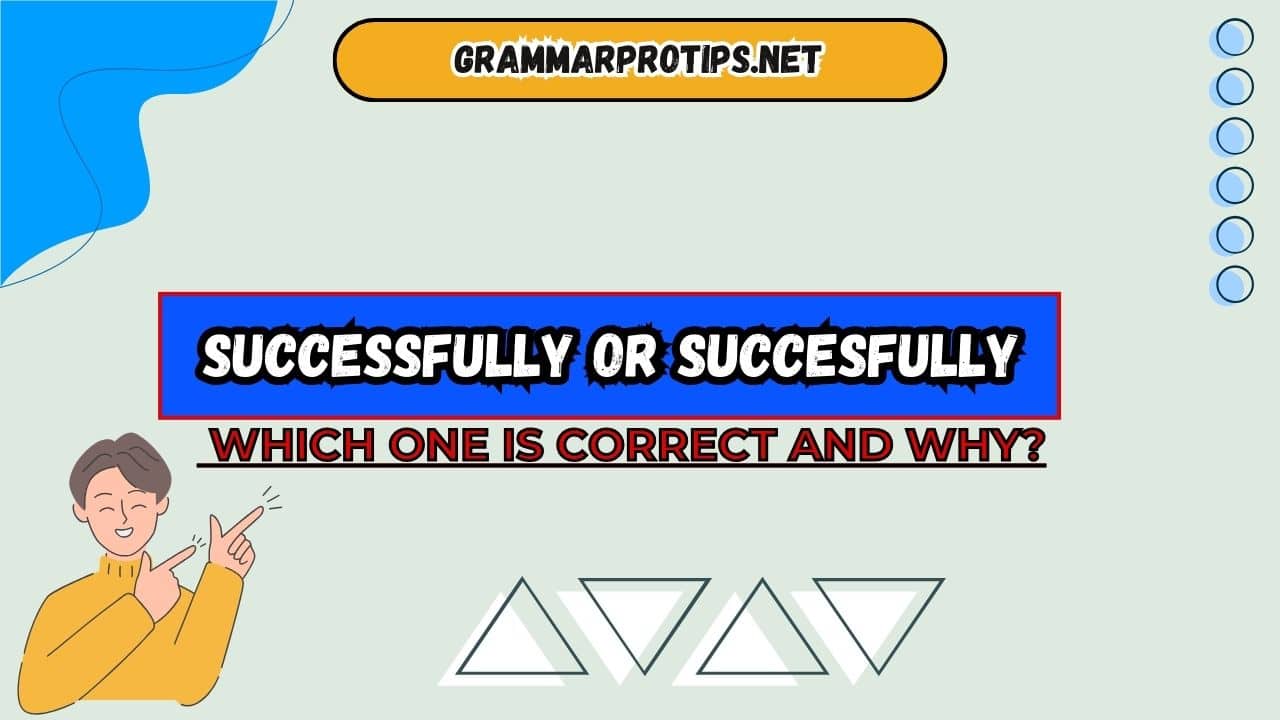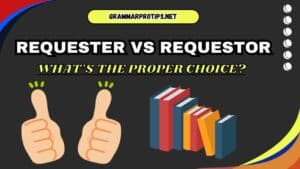If you’ve ever found yourself questioning whether to use “successfully” or “succesfully” in your writing, you’re not alone.
This common spelling mistake often trips up even seasoned writers. So, let’s dive into the details and clear up the confusion once and for all.
In this article, we’ll explore which version is correct and why, explain the rules of spelling, and provide you with practical examples from different scenarios.
Whether you’re writing a formal business email, a casual note to a friend, or an academic essay, this guide will ensure you avoid the misspelling and maintain writing accuracy in your work.
The Correct Form: Successfully
The word “successfully” is the correct spelling, and it’s an adverb that describes how an action is carried out.
It’s derived from the noun “success”, which signifies the accomplishment or achievement of a positive result.
When you use successfully, you are emphasizing that something was done in a way that led to a favorable outcome.
For example, completing a project on time, landing a big client, or achieving a personal accomplishment can all be described as successfully done.
Example 1: Business Email
Let’s say you’re writing an email to a colleague about completing a project. You might write:
Subject: Task Completion Report – Project X
Dear Sarah,
I’m happy to report that we’ve successfully completed the first phase of Project X. The team worked hard to meet the deadline, and the initial feedback has been very positive. We look forward to the next steps!
Best regards,
John
In this example, “successfully” is used to indicate that the project phase was completed with a positive result.
The Typographical Error: “Succesfully”
Now, let’s address the misspelling: “succesfully”. Many people mistakenly type this version, but it’s not the correct spelling.
The issue lies with the spelling pattern specifically, the double “s” rule.
Why do people often make this spelling mistake? It’s simple: people may type quickly or may not be as familiar with the spelling rule for “success”.
This error commonly occurs when writers aren’t mindful of the double “s” in “success”, leading to an extra “e” in “succesfully”.
Common Mistakes and How to Avoid Them
One of the easiest ways to make sure you don’t fall into the trap of misspelled words like “succesfully” is to remember that “successfully” follows the same spelling pattern as “success”.
Here are some tips to avoid making this mistake in your writing:
- Double-check your work: After typing out the word, take a moment to read over it and look for any spelling errors.
- Use spell check: Tools like Grammarly or Microsoft Word’s built-in spell checker can help catch misspelled words.
- Practice the spelling pattern: The word “successfully” uses the double “s”, just like the base word “success”. By recognizing this, you can avoid misspelling it as “succesfully”.
Why Spelling Matters in Writing
You might be wondering why the difference between “successfully” and “succesfully” is so important.
After all, it’s just a small error, right? While that’s true, such spelling mistakes can undermine your professional writing or any business communication.
Imagine sending an email to a client or submitting a report with misspelled words. It might make you look less careful, even if your work is otherwise excellent.
Consistent, error-free writing shows that you pay attention to detail and care about the quality of your work.
Conversely, a small typographical error can distract from your writing clarity and may cause readers to question your level of writing accuracy.
What Makes a Word an Adverb?
Both “successfully” and “succesfully” are adverbs. But what exactly does that mean?
An adverb is a word that modifies a verb, adjective, or another adverb. “Successfully” modifies a verb, usually to describe how an action was performed.
For example, when you say “She completed the task successfully,” you’re explaining how she completed the task she did so in a way that achieved success.
In other words, successfully describes the manner in which something is done, and it provides more context to the sentence.
This is an important concept in both business writing and academic writing, as it helps to clarify the outcome of an action.
Common Synonyms for “Successfully”
To add variety to your writing and avoid overusing the word “successfully”, consider using synonyms. Some alternatives include:
- Effectively
- Competently
- Flawlessly
- Adroitly
- Masterfully
Each of these words implies that the task was carried out with skill or positive result. For example:
- “He completed the project effectively” suggests that he achieved the goal with skill.
- “The team worked flawlessly to meet the deadline” implies that no mistakes were made.
Example 2: Academic Writing
In academic writing, precision and clarity are key. Here’s how you could use synonyms for “successfully” in a research paper:
“The team was able to effectively analyze the data, leading to a favorable outcome in the experiment. Their masterful interpretation of the results contributed to the overall achievement.”
The Importance of Spelling and Grammar in Professional Writing
Spelling and grammar mistakes are not only about making your writing look neat;
they are also about conveying your message clearly. In business writing, emails, proposals, or reports that contain misspelled words can appear less polished.
For example, “succesfully” would stand out as a spelling mistake and might distract from your overall message.
Think about it: if you’re sending an email to a potential client, and you spell “successfully” wrong, they might question your attention to detail.
On the other hand, error-free writing gives the impression that you are both competent and trustworthy. This is crucial in any professional or academic setting.
Is There a Difference Between British and American Spelling?
Interestingly, while “successfully” is universally the correct form in both British and American English, some words can have different spelling patterns across the two regions.
For instance, “realize” (American English) vs. “realise” (British English).
However, with “successfully”, the spelling is the same on both sides of the pond.
So, no matter which version of English you’re using, you can be confident that “successfully” is always correct.
Example Scenarios: Using the Word Successfully
Let’s now take a look at how “successfully” and “succesfully” can appear in everyday sentences and emails.
Scenario 1: Academic Achievement
Imagine you just received a great grade on your final exam, and you’re telling a friend about it:
“I successfully passed the exam with flying colors! It feels great to see my hard work pay off.”
In this scenario, “successfully” shows that you completed the exam with a positive result—in this case, a great grade.
Scenario 2: Business Communication
Now, let’s say you’re updating a client about the completion of a project:
“Dear Mr. Thompson,
I’m pleased to inform you that we’ve successfully completed the project ahead of schedule. The team worked diligently to ensure the highest quality results. I look forward to your feedback.”
Here, “successfully” highlights that the project was finished effectively, and it suggests a favorable outcome.
How to Spell Successfully and Avoid Common Mistakes
To sum up, the correct spelling is “successfully”, not “succesfully”.
This may seem like a minor detail, but it plays a crucial role in writing accuracy and in maintaining the professionalism of your written communication.
By following a few simple rules like remembering the double “s” in success you’ll avoid typographical errors in the future.
When in doubt, check your spelling, rely on spell check tools, and, most importantly, remember that accuracy matters.
Successfully vs. Succesfully
Here’s a quick reference table to help you distinguish between the correct and incorrect forms of the word:
| Aspect | Successfully | Succesfully |
|---|---|---|
| Correct Form | Yes | No |
| Part of Speech | Adverb | Adverb |
| Meaning | Done in a way that achieves a positive result | Incorrect spelling of successfully |
| Common Use | Used to describe the manner in which an action is completed | Incorrect usage often caused by typographical error |
| Example in a Sentence | “She completed the project successfully on time.” | “She completed the project succesfully on time.” |
| Spelling Rule | Follows the double “s” rule from success | Misspelling of “successfully” |
| Correcting Mistakes | Double-check spelling or use spell-check tools | Replace with “successfully” |
This table highlights the distinction between the correct and incorrect form, explains the meaning, and provides a quick reference to help you spot and fix any misspelled words in your writing.
It also emphasizes the importance of spelling accuracy to ensure professional communication.
Conclusion
In conclusion, always use “successfully” in your writing it’s the correct form and ensures error-free writing.
By paying attention to spelling patterns, avoiding common misspelling pitfalls, and practicing good writing habits, you can ensure your work reflects both your expertise and professionalism.
Whether you’re crafting a business email, an academic paper, or simply trying to communicate your latest accomplishment, remembering this simple rule will enhance the clarity and credibility of your writing.
Stay mindful of your spelling, and you’ll be on your way to successful communication every time.
Read more knowledgeable blogs on Grammar Pro Tips

Sienna Mauldon is a passionate writer and grammar expert. On her blog, she shares easy-to-follow guides to help readers master grammar rules and improve their writing. With a love for language and teaching, Sienna makes grammar simple and fun for everyone, from beginners to experienced writers.








